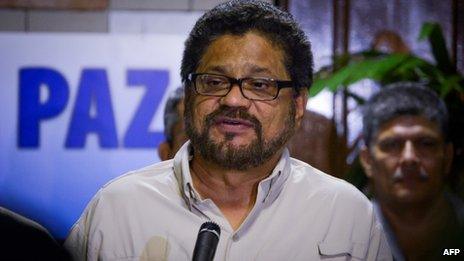Farc negotiator: Colombian conflict 'nearing an end'
- Published

Ivan Marquez - real name Luciano Marin Arango - took part in the previous direct peace talks, which ended in 2002 without an agreement
The chief peace negotiator for Colombia's Farc rebel group has said the armed conflict that has lasted more than five decades is nearing an end.
Ivan Marquez, who is taking part in talks with the Colombian government in Cuba, has called on left-wing parties and unions to join the effort to achieve peace.
The government wants a peace accord to be agreed by November.
But Mr Marquez warned against rushing into a settlement.
"It is possible [to reach an agreement by November]. But to achieve peace you need time. A bad peace deal is worse than war," he said in an interview with Colombian network RCN.
The first direct talks between Colombia's largest rebel group and the government were launched in Cuba in November last year.
Chief government negotiator Humberto de la Calle said the aim was to get the rebels to give up their armed struggle and join the political process.
Agreement has already been achieved on land reform, but the negotiations are continuing on five other items on the agenda.
But in Bogota many people are still sceptical about Ivan Marquez's statement, says the BBC's Arturo Wallace.
They see the rebels' participation in the peace talks as a pretext to gain time and regroup.
IRA talks
"No one can doubt that we are making a real effort to achieve peace. That is why we are here in Havana," Mr Marquez said.
"Wars are not eternal. We are certain that the five-decade long Colombian armed conflict is nearing and end."
The Farc negotiator said recently that a Constitutional Assembly should be called to endorse the agreements reached in Cuba.
Ivan Marquez said the end of the left-wing group's armed struggle was not being discussed with the Colombian negotiators.
"We have been looking into other experiences. We have met the Irish, the IRA, and we found there a formula that needs to be very well studied," he said.
"The most important is to make sure the weapons are out of reach, that they cannot be used."
Hundreds of thousands of people have been killed since the conflict began in the 1960s, with some three million more internally displaced by the fighting.
The Revolutionary Armed Forces of Colombia (Farc) are thought to have some 8,000 fighters, down from about 16,000 in 2001.
This is the fourth attempt at a negotiated peace deal since the beginning of the conflict in the early 1960s.
- Published11 June 2013
- Published27 May 2013
- Published9 April 2013